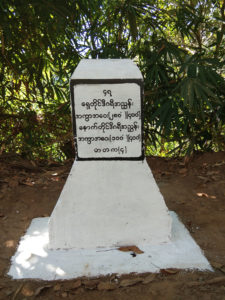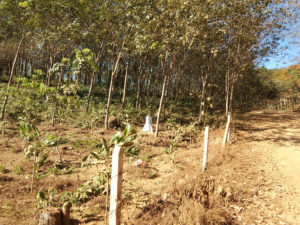Fears of land confiscation grow as military marking-stones discovered on farmland
January 23, 2019
HURFOM: Residents of Wae Kalee village, Thanbyuzayat Township, have growing concerns about land confiscation upon discovering land-marking stones demarcating some 500 acres of local farmland, believed to be laid by forces training at the nearby Advanced Military Training School No. 4, according to reports.
 “They [military trainees] planted land-marking stones a month ago but did not inform us. The demarcation started at the west entrance of their military base. The milestones are very near to each other at the west entrance and further apart a closer to the plantations on the hill. They didn’t inform the plantation owners about the demarcation. As the locals have experienced land confiscation by the military in the past, they’ve been worried about further land confiscation. Because the military planted these new land-marking stones, locals believe their plantations will surely be confiscated,” said Nai M—, a plantation owner whose land has been marked by the military.
“They [military trainees] planted land-marking stones a month ago but did not inform us. The demarcation started at the west entrance of their military base. The milestones are very near to each other at the west entrance and further apart a closer to the plantations on the hill. They didn’t inform the plantation owners about the demarcation. As the locals have experienced land confiscation by the military in the past, they’ve been worried about further land confiscation. Because the military planted these new land-marking stones, locals believe their plantations will surely be confiscated,” said Nai M—, a plantation owner whose land has been marked by the military.
The plantations in question, all of which primarily produce rubber, are divided between landowners who possess Land Use Certificates (LUC Form No. 7), and those who farm their land under traditional land tenure, but without official documentation.
“When the rubber plants weren’t ready to produce latex, they [the military] did nothing. But the rubber plants have matured, and they all are ready to produce latex. Now, the military has planted land-marking stones and created demarcations so we’ve been worrying that our plantations will be confiscated. We complained that we have [LUC] Form No. 7, and that it’s illegal to place a marking on our plantation…But they told us to just ignore the stones, and do our work on the plantation as usual. Still, we’re concerned because our plantations have been marked with milestones…We’re afraid that the military will confiscate our plantations one day,” continued Nai M—.
In the past, the Advanced Military Training School confiscated local plantations, claiming that the lands fell within the boundaries of the school’s shooting range, and only allowed owners to resume work on their plantations once they had paid an arbitrary tax.
However, some plantations were confiscated in their entirety by the military, while others were seized and then sold to new owners by military officials. In particular, Burma Artillery Regiment Command No. 315 (ARC 315), stationed in Thanbyuzayat Township, has been documented as confiscating rubber plantations in the area and selling them to new owners.
Between 2001 and 2004, more than 1,500 acres of plantation lands close to Sakhan Gyi village, approximately 1,000 acres of plantation lands surrounding Wae Kalee military base, and between 400 to 600 acres of plantation lands in close proximity to ARC 315 were seized by the military.
 Across Burma, land is people’s primary asset, with 70% of the population living in rural areas and dependent on small-scale farming for their livelihoods. Though land lies at the center of rural life, land tenure for Burma’s small-scale farmers remains unprotected and insecure. Military expansion, the increase of foreign investment, and a general lack of rule of law mean that land confiscation is endemic throughout Burma, and for residents of Wae Kalee village, the appearance of new land-marking stones suggest the that military is preparing to once again seize their lands in what is only the latest episode in an on-going series of land rights abuses.
Across Burma, land is people’s primary asset, with 70% of the population living in rural areas and dependent on small-scale farming for their livelihoods. Though land lies at the center of rural life, land tenure for Burma’s small-scale farmers remains unprotected and insecure. Military expansion, the increase of foreign investment, and a general lack of rule of law mean that land confiscation is endemic throughout Burma, and for residents of Wae Kalee village, the appearance of new land-marking stones suggest the that military is preparing to once again seize their lands in what is only the latest episode in an on-going series of land rights abuses.
Comments
Got something to say?
You must be logged in to post a comment.



















































